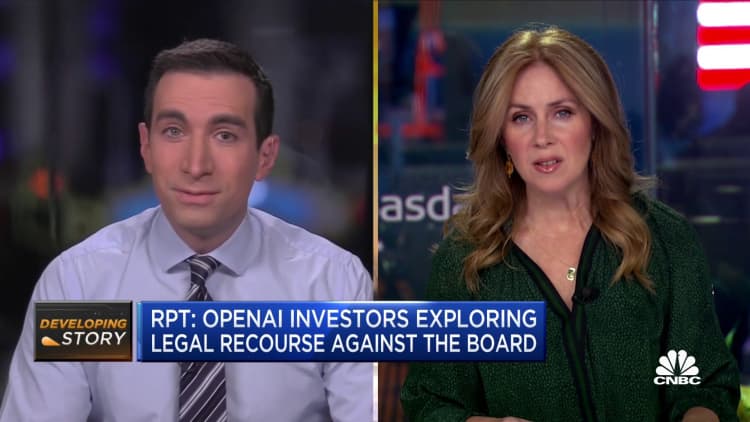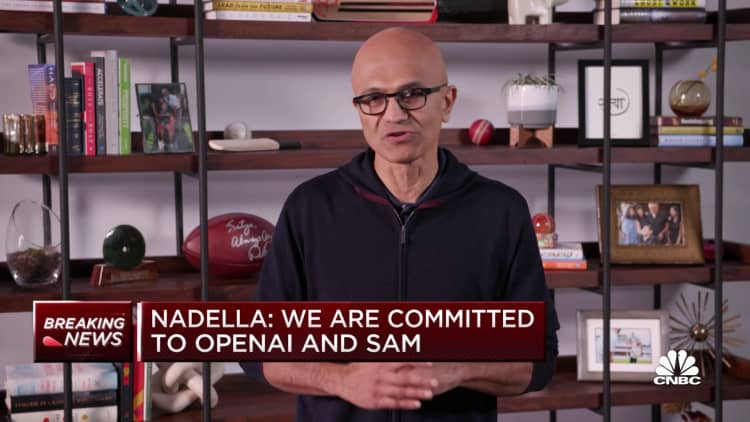
Jaap Arriens | Nurphoto | Getty Images
When there was a companywide protest at OpenAI after its CEO Sam Altman was ousted, software startup CEO Arjun Bansal began fielding increased calls from customers asking for help to lessen their use of OpenAI’s GPT large language models.
At his startup Log10, Bansal oversees the production of tools that third-party developers can use to build LLM-powered applications. Since the OpenAI drama unfolded, Bansal told CNBC the startup’s instability was a reason customers cited.
“People have been reaching out on how they would go through that process of being able to fine-tune different models or try out different providers with minimal disruption to how their code is set up,” Bansal told CNBC. “It is a very unprecedented situation, that a company of this size with this very unusual governance structure has gone through so much change in just over a weekend.”
A spokesperson for OpenAI declined to comment but said the startup’s services are working again following three hours of issues.
OpenAI’s board of directors fired Altman Friday after determining he was “not consistently candid in his communications” with them, according to a statement.
After a long weekend of negotiations that appeared to result in reinstating Altman at the company, ex-Twitch CEO Emmett Shear announced he had been appointed interim head, and Microsoft CEO Satya Nadella said the software maker would hire Altman, along with fellow OpenAI co-founder Greg Brockman and their colleagues.

However, more than 90% of OpenAI employees signed a letter to the company’s board demanding that they resign, or staffers might choose to leave. Now, Shear is reportedly considering leaving if the board doesn’t provide evidence of their reasoning for firing Altman in the first place.
Bansal is one of several startup entrepreneurs who told CNBC they or their customers are considering relying less on OpenAI’s GPT family of LLMs in the days since the board pushed out Altman.
“There’s definitely people taking it quite seriously,” Bansal said.
One founder of an AI startup, who asked not to be named in order to discuss internal matters, said he uses multiple application program interfaces from OpenAI and has considered switching to offerings from Anthropic, the AI startup founded by former OpenAI executives with backing from Amazon and Google.
The startup founder said he considered alternatives over the weekend after Altman was ousted, and their concerns grew stronger once OpenAI announced it had selected Shear as Altman’s successor.
Shear is a Silicon Valley veteran, having founded livestreaming platform Justin.tv in 2007 that eventually evolved into Twitch, a popular streaming site for gamers. Amazon acquired Twitch for almost $1 billion in 2014. The source, who previously worked alongside Shear, said Shear is “very smart” and admires his integrity.

But he’s not sure if Shear is the right person to lead a company like OpenAI that’s at the forefront of the world’s AI boom.
Martin Kon, president and chief operating officer of Cohere, which also provides LLMs for use in applications, said in a Tuesday statement that he’s seen an increase in inquiries since OpenAI’s drama unfolded.
“Enterprises value certainty, as the significant increase of inbound inquiries we’ve seen this week demonstrates we are still early in enterprise AI adoption, and companies are taking a hard look at how much they value cloud flexibility and independence from big tech,” Kon said.
But some startups are struggling to incorporate multiple LLMs into their applications.
One founder CNBC spoke with said Anthropic has a waiting list, so that even if people are clamoring to use its services, they might not be able to do so right away.
While there are a variety of LLMs available to use, including open-source options such as Meta’s Llama 2 AI software, the consensus is that the GPT-4 model is the most capable of performing complicated tasks at an affordable price. OpenAI lowered its fees earlier this month.
OpenAI employees try assuring clients
Although the tech industry has credited OpenAI for popularizing the use of AI software that analyzes written text and produces human-like copy, the company now finds itself in a defensive position.
OpenAI employees are trying to assure customers that they are committed to them.
“We are still fully committed to our incredible community of developers and users,” Srinivas Narayanan, whose profile lists him as an OpenAI vice president, wrote on X Tuesday.
“The API team is here. The ChatGPT team is here,” wrote Steven Heidel, a member of OpenAI’s technical staff, in a post Tuesday. “We are all still fully committed to our developers and users.”
Nadella attempted to quell concerns during an interview with CNBC’s Jon Fortt Monday evening.
“Quite frankly, Microsoft has all the capability to just do that on our own but we chose to explicitly partner with OpenAI and we want to continue to do so,” the CEO said.

Some of OpenAI’s customers, however, see more upside in sticking with OpenAI.
Michael Buckley, CEO of a company called Be My Eyes, which makes a mobile app that uses image recognition to help describe objects to the visually impaired, told CNBC that one of its products has been using the GPT-4V model with support for analyzing images since February. He’s decided to stick with OpenAI despite an influx of calls asking him to do otherwise.
“I’ve been bombarded by sales calls from rival LLM companies seeking some opportunistic business wins,” Buckley said. “That’s fair game and business is a contact sport so I get it. And we were already evaluating backup providers as a hedge before the drama.”
Buckley added that he believes OpenAI’s models are “excellent” and that he’s appreciated the company’s loyalty to him since its early days.
Alexander Kvamme, co-founder and CEO of startup Pathlight, said that while his company draws on multiple LLMs in its customer support and sales software product, OpenAI’s GPT models can outperform on more complex tasks — such as analyzing thousands of sales calls, so that companies can ask questions about customer churn and related trends that the AI software can presumably answer.
Kvamme said his team hasn’t experienced any major GPT-related issues yet and members of OpenAI’s customer support team have been answering technical questions despite the corporate drama.
“To Sam’s credit and Satya’s credit, they are finding ways to keep the lights on and kind of keep things working through all this turmoil given the kind of OpenAI and Microsoft relationship,” Kvamme said, referring to OpenAI’s use of Microsoft’s Azure infrastructure. “At the end of the day so far, our customers and developers have not been impacted.”
Other technologists told CNBC that while they haven’t experienced significant problems with GPT-enabled services in the past few days, they are concerned it’s only a matter of time before they do.
“I do know quite a few companies that are basically trashing their current product roadmap and saying, like, you know, we need new infrastructure,” Kvamme said.
On Wednesday, Brockman wrote on X (formerly known as Twitter) that a voice-activated version of OpenAI’s popular ChatGPT app is now available for everyone to use for free.
“Give it a try — totally changes the ChatGPT experience,” Brockman said.
— CNBC’s Jordan Novet and Annie Palmer contributed to this report.
